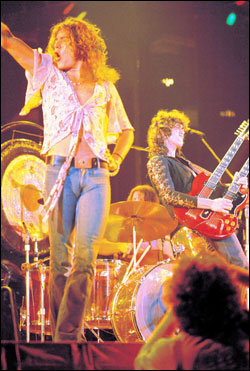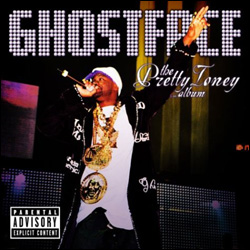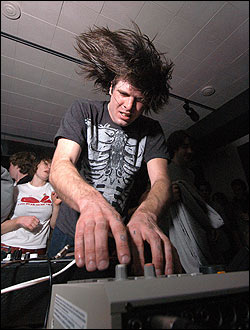ASHLEE SIMPSON
Autobiography
(Geffen)
Most of the alt-rock ’90s was a slog, so is it any wonder we wanted bubblegum after chewing gravel? But a good pop song is one that fulfills its main goal—reaching as many people as possible—without being a hackneyed MOR suckfest, and with the body glitter cleared, we can finally admit that for every “Everybody (Backstreet’s Back)” or “Baby One More Time,” there’s been a Jessica Simpson, who’s like a glass of milk with a cigarette in it, or an LFO, who are like drinking that milk on a dare. The best teen pop is made with wit, hooks, and a subtle wink— all things the current model, a sort of dumbed-down emo-bubblegrunge we’ll shorthand as Avril-Rock, is completely devoid of. When Liz Phair has bigger and better hooks than the actual teens, you know some weird transubstantiation has taken place.
No one represents the profits and perils of Avril-Rock better than Jessica Simpson’s little sister, Ashlee, the emo Valerie Bertinelli. Taken as a collection of songs, her debut album, Autobiography, is a big, steaming turd. This thing makes the Donnas sound like free jazz. The production could suffocate bacteria. The playing sounds like the studio hacks from a mid-’80s Don Henley session air-dropped into an Urban Outfitters. As her TV show demonstrates, she sings and dances like a drunk college sophomore at Fat Tuesday’s. Ashlee’s “autobiography” is that she felt slighted when her sleazy, born-again parents doted on her prettier, more talented older sister, but once she grew up and Daddy got her a show of her own (and an album deal), she realized that maybe life wasn’t as hard as people starving and stuff. This album is creepy the way only teenage girls acting as old men’s puppets can be, and never more so than when they throw a salacious, gross, grown-up detail (“You can throw me like a lineman/I like it better when it hurts”) into a song where the title chorus of “La La” stands in for “fucking.”
VARIOUS ARTISTS
Now 16
(UTV)
Hooks, talent, and charisma be damned, the little girls seem to love Ashlee. Maybe they just love her because she isn’t R&B or rap. By 2000, the best middle-class white folks’ music was indistinguishable from the best middle-class black folks’ music. This made the charts a lot more interesting, but it also alienated a large chunk of the audience for whom tumbling polyrhythms were anathema to teen pop’s Abba-esque backbeat; it inspired more than a few radio stations to adopt an “all the hits, none of the rap” format. Now the hardest rap is often the most popular, but even as a fan, its “Stomp that nigga/Choke that ho” mentality can be wearying.
But it’s gotta be really disconcerting in an “I’m missing you like candy” context. Which is what makes Now 16 such a perplexing document. America hijacked the Now compilation idea from England in the late ’90s, when labels realized they could print money by manufacturing the same CD compilations that savvy Top-40 listeners were already Napstering for themselves. The charts are very different now, but the concept persists.
As someone who works in a record store, I’d put the average age for Now fans at 8 to 13; they pay with crumpled 20s earned for good report cards. So what the fuck is Juvenile’s “Slow Motion,” a salacious ode to hitting fat asses from the back, doing here, or Petey Pablo’s badass stripper anthem “Freek-a-Leek”? Call me a prude, but my spawn wouldn’t be learning Our Bodies, Ourselves from Petey Pablo. (The boring rock songs that make up the back end of every Now comp deserve even less discussion than usual with 16. Lenny Kravitz?) Nina Sky’s “Move Your Body” is ideal teen pop, but for a world where Althea & Donna’s “Uptown Top Ranking” is as big as “Oops, I Did It Again.” Still, “Move Your Body” will be remembered with fondness long after memories of Yellowcard fade away.
VARIOUS ARTISTS
Now That’s What I Call Music 58
(EMI, U.K.)
Only four songs—and none of the rap or rock—repeat from our Now to the most recent British Now, No. 58, which includes a bunch of stuff (Franz Ferdinand, the Scissor Sisters) we Yanks would call “indie.” This is because the U.K. charts have an impossibly broad definition of “pop,” and because they don’t like hard-core rap or grunge. This presents its own set of problems: A 300-pound football bruiser may love Britney as much as his daughter, but he also has a weakness for the ass-end of trad pop ballads, Spice Gunk, and terminal novelty.
But sometimes that novelty up and smacks you in the face. Rachel Stevens was the one with the biggest boobs in S Club 7. (Remember S Club 7? Of course you do.) “Some Girls” was produced by cheeky chappie Richard X, and its snarling system noise falls somewhere between Kompakt’s shuffle-beat and Depeche Mode’s “Personal Jesus.” The verses are agreeable nonsense, and the chorus is 24-karat pop gold. If the charts were full of stuff like this and Brit’s “Toxic,” we’d be aces. As it is, we’ll probably have to suffer through Lindsay “Your Palms Will Turn Hairy If You Keep Doing That” Lohan’s solo album after she dumps Fez for Conor Oberst.







